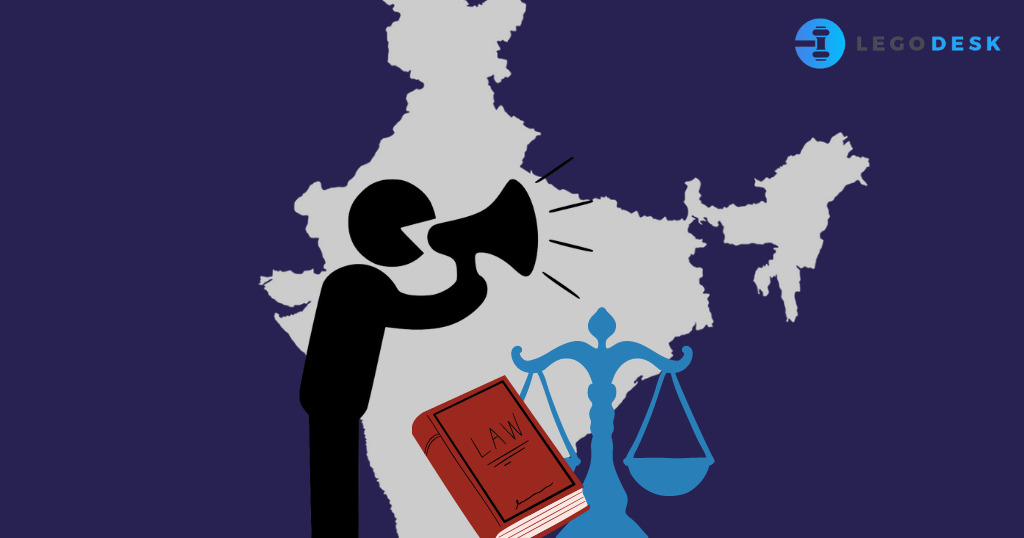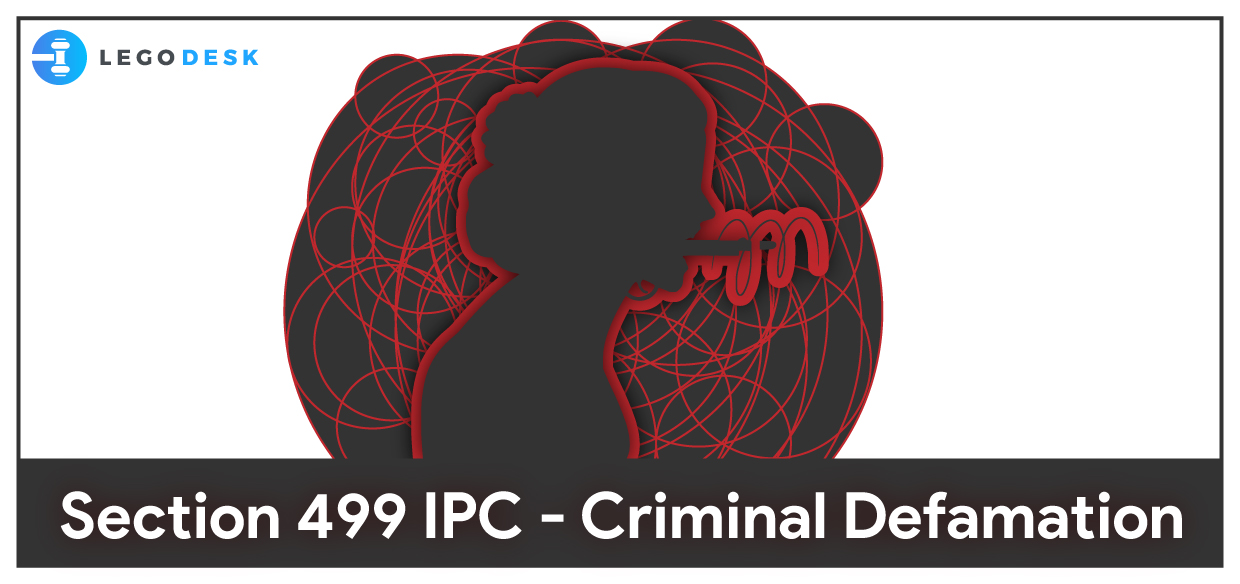Criminal defamation, as defined in section 499 IPC, is one of the most controversial provisions under the Indian Penal Code, 1860. Time and again, we see defamations news popping up on our televisions and newspapers. Defamation is civil wrong under the tort law as well as a criminal offense under the IPC. We all are well aware that the right to speech is a fundamental right under the Constitution; therefore, the offense of defamation is debated on this issue. But the Supreme Court has held in several cases that the offense of defamation under Section 499 does not violate Article 19 of the Constitution.
“Freedom of speech and expression is not absolute. The concept of social interest has to be kept in mind when considering the reasonableness of a restriction”. [1]

What is Defamation?
Section 499 says that whoever, by words either spoken or intended to be read, or by signs or by visible representations, makes or publishes any imputation concerning any person intending to harm, or knowing or having reason to believe that such imputation will harm, the reputation of such person, is said, except in the cases hereinafter expected, to defame that person.
Explanation 1.—It may amount to defamation to impute anything to a deceased person, if the imputation would harm the reputation of that person if living, and is intended to be hurtful to the feelings of his family or other near relatives.
Explanation 2.—It may amount to defamation to make an imputation concerning a company or an association or collection of persons as such.
Explanation 3.—An imputation in the form of an alternative or expressed ironically, may amount to defamation.
Explanation 4.—No imputation is said to harm a person’s reputation, unless that imputation directly or indirectly, in the estimation of others, lowers the moral or intellectual character of that person, or lowers the character of that person in respect of his caste or of his calling, or lowers the credit of that person, or causes it to be believed that the body of that person is in a loathsome state, or a state generally considered as disgraceful. [2]
Therefore from the above provision, it is evident that defamation is done not only through words spoken but also written. It may be done by signs or visible representation that is directed towards a particular person to cause harm to a person’s reputation. There are four exceptions provided under the provision.
Explanation of Criminal Defamation
Right to speech and expression is one of the important Fundamental rights; therefore, when it is made, limited necessary points need to be considered. Defamation is made an offense under the criminal law, and certain explanations are attached to it to make the understanding clear.
- Deceased person- usually no defamation is caused to a person who is dead, but, it may amount to defamation if the statement to act done to defame that person causes harm or is derogatory to his family or any of his family members.
- Corporate body- Although it was controversial as to whether the corporate body can file a defamation suit. The SC strike out the balance between Art. 19 and the right of corporate bodies to file criminal defamation case for alleged damage to reputation.[3]
- Indirect statement- Sometimes, even an ironically passed statement may also amount to defamation.
- Lowering intellectual- if a statement is passed by a person to lower the person reputation, then it would be defamatory.
Defamation in English Law
Defamation in English law is classified under two categories-
- Libel- representation made in some permanent form. For eg.- publication in a newspaper or any other writing form.
- Slander-statement made in some transcient form. For eg.- by spoken words.
In India, there is no such classification of the offense of defamation. The Madras and Bombay High court has also held that there is no need to make such classification under the Indian criminal law.[4]
Examining the Constitutional Validity of Criminal Defamation
What’s in a Name?
The question that sears through the minds of the people is whether the freedom of speech and expression should be allowed to grow and mature to such an extent, that it outweighs the right of an individual to enjoy a healthy reputation.
Currently, the criminalization of defamation has caused unrest and disturbance among the people. By attracting a civil and a criminal remedy, it essentially seems like a double-whammy on the right to free speech.
Freedom is a very uncertain and ambiguous notion. One man’s freedom could be another man’s incarceration. Most importantly though, too much of freedom could be prone to unreasonable usage. The dilemma here, however, is to determine what amounts to reasonableness.
Jean-Jacques Rousseau uttered the immortal words, “Man is born free, and everywhere he is in chains.” Correctly so, the ideas of justice, equity, and liberty are open to interpretation. Nonetheless, the restrictions upon the various rights and freedoms are like these proverbial chains.
The Importance of Speech
Speech is a very powerful tool. It may make a man, or effectively break him. As a person, are we not free to express our perception of something or someone? Can we not express and make known to our countrymen, what our perspective is?
The public may admit or admonish an individual’s opinion, and of course, that will be their opinion. Yet, the very act of making something available for public scrutiny cannot become a crime. Technically, one is free to express his opinions that are based on reasonable facts. However, the reality is far from it sometimes.
Any individual can, at the very outset, construe another person’s opinion to be borne out of malice. This would indeed have a “chilling effect on speech”, thereby handicapping the most vocal of Freedoms. We banished the erstwhile Section 66-A of the IT Act since it had caused a similar effect.
Exploring the Role of the Judiciary
The Supreme Court had clarified about the phrase ‘reasonable restriction’ in Chintaman Rao v. State of M.P. [7]. It does not mean an “arbitrary” or “excessive” limitation, “beyond what is required in the interests of the public”. “The word ‘reasonable’ implies intelligent care and deliberation, that is, the choice of a course which reason dictates”.
Ironically, the yardstick for measuring the “interests of the public” is also prone to speculation. In the case of Senior Electric Inspector v. Laxmi Narayan [8], the Court was pleased to observe that,
“In a modern progressive society, it would be unreasonable to confine the intention of a Legislature to the meaning attributable to the word used at the time the law was made, for a modern Legislature making laws to govern a society which is fast-moving must be presumed to be aware of an enlarged meaning the same concept might attract with the march of time and with the revolutionary changes brought about in social, economic, political and scientific and other fields of human activity. Indeed, unless a contrary intention appears, an interpretation should be given to the words used to take in new facts and situations, if the words are capable of comprehending them.”
Furthermore, for testing the proportionality of a restriction, one must weigh the punishment prescribed against the gravity of the offence. [9]
Upon considering the offence of defamation with some of the more stringent crimes like theft or rape, the victim of defamation has ample opportunity to respond to the allegations and set the record straight. It is quite possible to eke out a humane conclusion to such a chapter.
Inference
The colonial rulers enacted the Indian Penal Code in 1860. Today, this primitive Act must come to terms with the expanding ideals of society. A free and mature democracy requires a new train of thought, fashioned to assist the demands of the new generation.
It is quite ridiculous indeed that, ironical and satirical expressions could amount to criminal defamation. ‘Irony’ is a question of perspective, and to a certain extent, so is defamation. It seems arbitrary to imprison someone for saying something ‘ironical’ or ‘satirical’, along with the ruffians of the society. Besides, the ‘crime’ of defamation may attract imprisonment of up to two years, which seems grossly inappropriate.
Penal provisions accompany certain wrongs, to act as a deterrent, or as a preventive and/or retributive measure. However, the deterrence must not transcend that fine line which would suffocate free speech and thought. Obviously, this does not mean that everyone should have the right to state anything about anyone.
The only saving grace to the criminalization of defamation is that such offences are bailable and compoundable. Interestingly, the Supreme Court has also been very firm in protecting the constitutional validity of criminal defamation.
As this war wages on, the politically, socially, and economically well-endowed continue to skirt around speeches and other forms of public display of opinion. Nonetheless, the country is probably not ready to deal with the absolute decriminalization of defamation. Meanwhile, even if defamation is not decriminalised, various words and phrases in Section 499, must be relieved of their ambiguity.
We must certainly regulate speech and expression. Consequently, we must also refine and polish the yardstick for measuring defamation to suit today’s democracy. We all have a right to express our opinion of someone or something, and the correctness of the same must be determined less strictly.
Exceptions of Defamation
- Justification of truth- Law, will not guide a person or favor a person to receive compensation for something true. In a case, the defendant published a defamatory statement against, but the statements were true, so it was not considered as an offense.[5]
- Fair comment- making fair comments in the public interest is not defamation.
- Privilege- Giving special status to certain persons protects them from the offense under section 499. These privileges are absolute as well as qualified.
Conclusion
Defamation is one of the most controversial offense. Right to Speech is a fundamental right guaranteed under our Constitution, but the right is not absolute, and it is restricted. The offense of defamation is a form of this restriction made on the Fundamental Right. A person cannot speak or publish any derogatory remarks for any other person.
[1] Subramanian Swamy v. Union of India, Ministry of Law &ors. (2014) SC 184.
[2] Indian Penal Code, 1860, s. 499.
[3] Priya Pillai v. Union of India & Anr. (2015) SC 132.
[4] Hirabai Jehangir v. Dinshawdulji (1927) Bom 22.
[5] Radheshayam Tiwari v. Eknath (1895) Bom 285.

